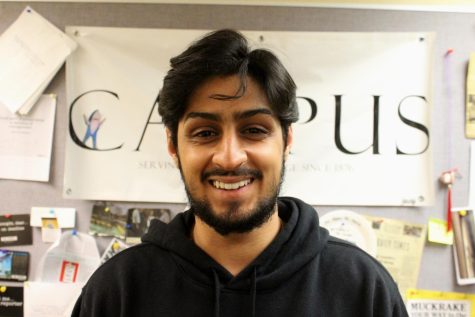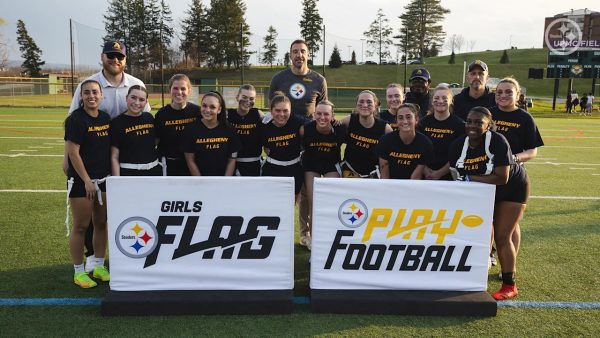Work study pay rates increased
Allegheny College students now have the opportunity to work less hours and earn at higher rates as student employees.
An Aug. 19 email by Financial Aid Counselor Jade Allen of the Student Employment Office announced changes to the pay rate structure, stating, “student academic pay rates will be increasing starting in the Fall 2022 semester.”
The email further clarified the establishment of different pay rates from $9 to $13 as compared with previous rates between $6 and $8.
Vice-President for Enrollment Ellen Johnson emphasized that changes to the student pay rate have come primarily from the college’s need to compete businesses in Meadville.
“Truthfully, we are being out-competed by off-campus employers when it comes to attracting students,” Johnson said. “Students look at the benefits of higher pay and no limit to working hours and choose to work off-campus instead.”
Johnson hopes that higher pay rates will be enough to compel students to find employment on campus.
According to Johnson, the changes to the student pay rate are significant as there has never been such a drastic increase in the school’s history.
“We usually entertain smaller increases of $0.25 or $0.50,” Johnson said. “This increase is sizable and comes at a time when many people complained about the previous pay rates being too low.”
The last review of student pay rates came in 2019, before the COVID-19 pandemic. According to Johnson, the pandemic had a considerable impact on student attitudes in regard to employment on campus.
Consequently, Student Employment reported being unable to successfully fill open positions on campus and deems the increase in the pay rate to be a step in the right direction.
Allen said that the college also hopes to allow students more time to explore different aspects of college life due to this change.
“Students no longer have to work as many hours to earn their awarded $2,500 in student work-study,” Allen said. “Since students are being paid more, they will be required and permitted to work fewer hours.”
Allen clarified that, depending on the pay rate, students will have more restrictive time limits on the amount of work they are allowed to do weekly.
Alexa Isaguirre Portillo, ’24, who is a member of the Bonner Program and serves as a program intern hopes that the pay rate will allow students to earn their full $2,500 in student work-study more successfully.
“At times over the last two years, many of my peers and I have felt that despite working significantly, we were still struggling to make enough at the end of the month,” Portillo said. “Bonner is a program that requires a lot of student commitment and contains a range of responsibilities, so I’m hoping students will be fairly compensated.”
According to the Federal Work-Study Program, “In a normal year, your school must use at least 7% of its FWS allocation to employ students in community service jobs.”
Consequently, the pay rate of Bonner students, who work in community service roles as part of the service-focused program, has doubled to $13 from $6.45, the highest offered pay rate.
Under the new system, Johnson said that not all student jobs will be paid at the same rate.
“Every year, supervisors from different offices on campus review their staff records and determine how many student workers they require,” Johnson said. “Similarly, depending on the job description and the skills required to fill the position, student employment along with supervisors determine the rate a job earns.”
Students will have the opportunity to earn higher rates upon working a role repeatedly over time and at the discretion of their supervisor, according to Johnson.
Nahayan Minhas, ’24, who works in the Athletics and Recreation Department and is an international student, believes that students are promised but do not earn the full $2,500 in student work-study aid.
“I feel that with the working limits along with the extensive taxes on our wages, we don’t end up earning as much as we are ‘awarded’ in our financial aid packages,” Minhas said.
Johnson clarified that Minhas’ claim has volume to it as, after tax, students cannot earn the full $2,500.
“It does state in financial aid packages that student work-study must be earned by the student but I do think it’s a good idea also to include a statement which tells students that they will be taxed on that part of the package and not earn the full stated amount,” Johnson said.
Johnson added that the college and the government both contribute to the funds that facilitate the federal work-study program on campus.
“We do not want to send the message that Allegheny is not being proactive and initiating more changes to student employment,” Johnson said. “Federal work-study is funded simultaneously by the school and by the federal government and so we must make decisions together.”
Johnson hopes that these changes, and future changes, will compel students to seek employment on campus and learn valuable life skills in doing so.
“The biggest value in student-employment is that students earn a living in a setting where they are students first,” Johnson said. “We want students to learn invaluable time management skills and how to prioritize their different involvements in college.”
Johnson also emphasized that students should reach out to either the Student Employment Office or the Financial Aid Office for any inquiries regarding student employment.

Hassan Javed is a junior from Lahore, Pakistan. He is majoring in Communication and Media Studies while minoring in Psychology. This is his third year...











